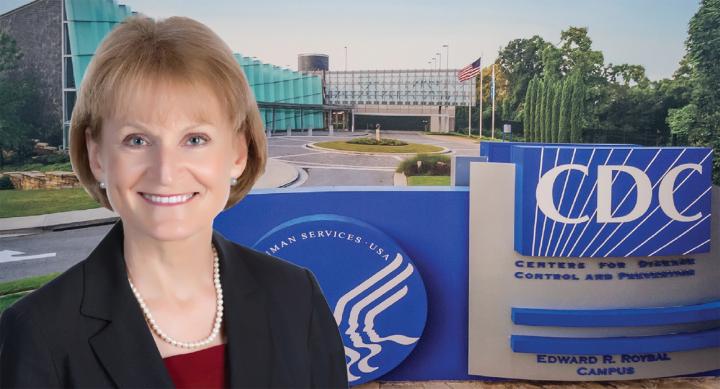
For over 70 years, the Centers for Disease Control and Prevention (CDC) has been the nation’s leading science-based, data-driven service organization that protects the public’s health. In August of 2022, at the request of Dr. Rochelle Walensky, former director of the CDC, Visiting Professor Mary Wakefield, PhD, RN, FAAN, stepped in as her senior counselor to revamp the CDC.
According to Wakefield, this role was specifically created to help the CDC strengthen its operations and processes, with the aim of improving the agency’s ability to meet its mission, not just for today but for the future. As with any organization, there are always opportunities to improve performance.
“Implementing strategies to effectively assess and realign agency operations, processes and policies to meet changing needs and expectations should be an ongoing effort — the CDC is no different,” Wakefield said.
Wakefield is a renowned trailblazer and advocate, with a tremendous impact on health policy through her roles in highprofile federal government positions. She has built a distinguished career across the country and the world.
Wakefield’s nursing background has always been foundational to her work in public health policy, including the implementation of health programs.
At the School of Nursing, she earned both her master's (1978) and doctoral (1985) degrees. She has used her UT Austin education to serve the public and make a substantial difference in health care access and delivery. “As a profession, nursing is laser focused on strengthening and supporting the health of individuals, families and communities,” Wakefield said. “Everything I’ve done across my career, including at the CDC, has aimed for that ‘north star’ — to engage in this work, scanning for and understanding the obstacles that stand in the way of achieving health and working to address them is essential.”
Parallel to this focus is the need to recognize opportunities for improvement and leverage them, including personnel expertise, policies and programs, and to do this as efficiently and effectively as possible.
For Wakefield, this orientation fits well with strengthening federal health infrastructure and programs. In her many years of working in public policy, Wakefield has led organizational changes in the U.S. Department of Health and Human Services (HHS).
As the head of the Health Resources and Services Administration (HRSA), a sister agency to the CDC, she initiated several organizational improvements. Wakefield viewed her job at the HRSA as both implementing the programs she directed by law, and, equally important, working creatively to improve their impact. This was also true for her role as acting Deputy Secretary of HHS.
She was appointed to both of these positions in President Obama’s Administration, as the first nurse to have received this honor.
“Throughout my work in federal government, I learned from exceptional leaders and staff, partnering with them to develop a shared vision of performance improvements that would strengthen agency programs and the organizational foundation on which those programs relied,” Wakefield said. “Leading at this level is about creating space for individuals with an array of expertise from across an organization to help identify and solve problems, often by creating and executing new approaches and strategies.”
Over 17 years of federal service provided Wakefield with a solid foundation for understanding how government works and what levers can be used to drive change.
In her six and a half months of intensive work with the CDC, Wakefield guided and supported several important efforts to strengthen the agency for future public health challenges by incorporating the views and expertise of leaders and other personnel across the agency.
These actions ranged from laboratory quality improvements to building out a broader, deeper emergency response workforce. Her leadership and work with others has given the CDC a clear roadmap to continue improvement and measure progress.
Wakefield has always appreciated the importance of a strong public health infrastructure, and the CDC, as the nation’s flagship public health agency, is central to this. She explained how the agency’s research, laboratory expertise, programs and policy development are critical to the U.S. but also the health of people around the world.
For the CDC’s success, a strong, forward-leaning operational foundation is essential.
For example, Wakefield said the CDC is expected to respond 24/7 to emerging and often unanticipated health care challenges. The agency’s work guides decisions made by American families, communities, health care providers including nurses and state governments.
The focus of its programs spans from chronic to acute health issues, which are often highly interrelated.
“Nothing better illustrates the importance of the CDC’s portfolio of programs existing side by side than the pandemic,” Wakefield said. “The virus required expertise in rapid emergency response coupled with expertise in chronic conditions, given its disproportionate impact on certain populations.”
This comprehensive expertise in both responding to acute health threats and minimizing impact on at-risk populations allowed the CDC to move faster and more comprehensively, even as it revealed opportunities for improvements in organizational performance.
Bottomline, Wakefield said that the CDC must be ready for emerging threats, without always knowing what shape those threats will take, where they’re likely to occur, or what populations may be most at risk — even as the agency helps the nation address high-priority ongoing public health challenges.
This requires harnessing new technologies and developing new infrastructure and organizational approaches in 2023 that are different from what they were in 2013 or will need to be in 2033.
“The public health experts at the CDC are world class,” she said. “And just as experts in public health and in every health care field need to plan for and adapt in response to new knowledge and environmental changes around them, the organizational entities that support their work, whether in the public or private sector, need to do the same. Initiating and sustaining this kind of focused effort isn’t easy, but it is essential.”

